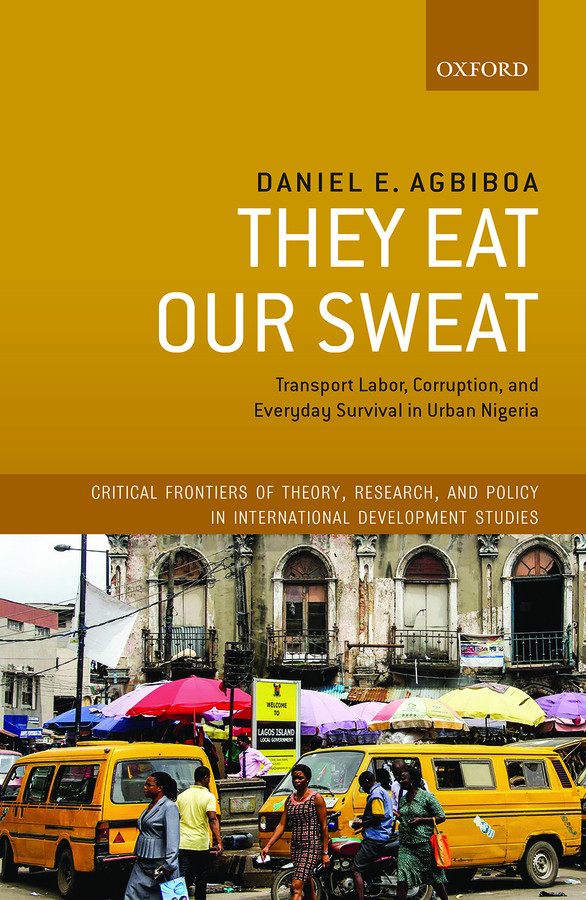Against a leaden sky, a strong feminine form with snake-like hair protruding from her head is confronted by a swarm of black birds. What initially appears to be an attack quickly turns into a feeding frenzy as the black shapes are crushed and absorbed by the throbbing, serpent-like body of the medusa. While Kenyan artist Wangechi Mutu’s work ‘The End of Eating Everything’ is meant as a striking visual commentary on the destructive properties of human overconsumption, it could work just as well as an allegory for the metastasizing affliction of urban corruption. As Daniel E. Agbiboa shows in his illuminating book They Eat Our Sweat, eating is a central notion in the vernacular of describing corruption in many African contexts. It is used ‘to express a variety of meanings linked to power and property’ (p. 81) and serves as a key tool for Agbiboa to unravel the trans-local ‘politics of stomach infrastructure’ (p. 90) he encounters in the local transport sector in Lagos.
In his monograph, Agbiboa presents the findings of a fine-grained phenomenological study of informal urban mobility that skillfully brings together corruption, language and social action through a ‘dialogical approach’ (p. 27). Writing in the tradition of critical ethnographies of the state, the author adds his voice to a growing chorus of anti-corruption scholars and activists who have argued that more experiential data is needed to better understand corruption in different settings and to devise more suitable and effective measures to counter it.
While this is an important contribution in and of itself, what makes this book particularly exciting from my own vantage point as an urban scholar is how it locates corruption within and narrates it from the realm of the city. Although both corruption and urbanization rank at the top of global policy agendas, the two seldom cross paths. Given the fact that cities are emerging as major flashpoints of corruption, this is a considerable lacuna. Mounting evidence from different cities across the globe suggests that rent-seeking negatively affects urban infrastructure provision and skews service delivery—often to the detriment of already vulnerable and marginalized groups—ultimately hardwiring unjust, corrupt relations into the very fundament of the city.
They Eat Our Sweat makes a profound contribution to this emerging debate on urban corruption and is thus a highly recommended read for urban and anti-corruption scholars and practitioners alike. Along with the introduction and conclusion, each of the book’s six chapters are subdivided into shorter subsections featuring crisp headings that make it easy to follow the author’s argument (although it would have been great to find these subheadings in the table of contents as well). From a methodological point of view, I particularly appreciated Agbiboa’s use of minibus taxi (danfo) slogans to trace—in an intellectual nod to literary scholar Ato Quayson—the urban ‘discourse ecologies’ of corruption. Taking the city literally in this way allows for a range of powerful visual and semiotic moves that are enriching for the reader—such as the consistent use (and careful translation!) of vernacular expressions and photographs. Regarding the latter, and especially given the colorful phenomenology of urban life in Lagos that Agbiboa relays throughout the text, it is a pity that images in the book are rather small and only in greyscale. However, given too the prohibitive pricing of color printing, this critique is squarely placed at the foot of the publisher, not the author.
Considering the creative and careful ways in which They Eat Our Sweat investigates everyday experiences of corruption through the lens of informal transport in Lagos, the book is further testimony to the fact that African cities are a prolific ground for theorizing contemporary socio-political relations across scale and disciplinary lines. Hence—and since the book draws heavily from and, I contend, also makes a sizeable contribution to the conceptual discourse on Southern Urbanism—it would have been desirable to see this connection being made more explicit. That said, the prolific empirical and conceptual intersections between a re-scaled anti-corruption and governance scholarship that takes corruption’s growing urban footprint seriously with a Southern urban scholarship that focuses on the multiple ways in which corruption shapes the daily lives of Southern city dwellers delineates a rich terrain for future comparative and transdisciplinary research interventions.
Overall, Agbiboa does a splendid job in rebuking the misguided, essentialist and frankly racist idea of an ‘African’ culture of corruption without romanticizing the complex patronage politics that profoundly shape the everyday urban experience of Lagosians. Well-researched, rich in content and accessibly written, They Eat Our Sweat is a timely intervention for anyone interested in new ways of understanding the critical intersections between everyday urban practice, transport infrastructures and the African state.
Laura Nkula-Wenz is a lecturer at the African Centre for Cities, University of Cape Town and a Postdoctoral Research Fellow at Urban Studies, Department of Social Sciences, University of Basel.
Daniel E. Agbiboa 2022: They Eat Our Sweat: Transport Labor, Corruption, and Everyday Survival in Urban Nigeria. Oxford and New York, NY: Oxford University Press. Cover used with permission of Oxford University Press.
Views expressed in this section are independent and do not represent the opinion of the editors.

